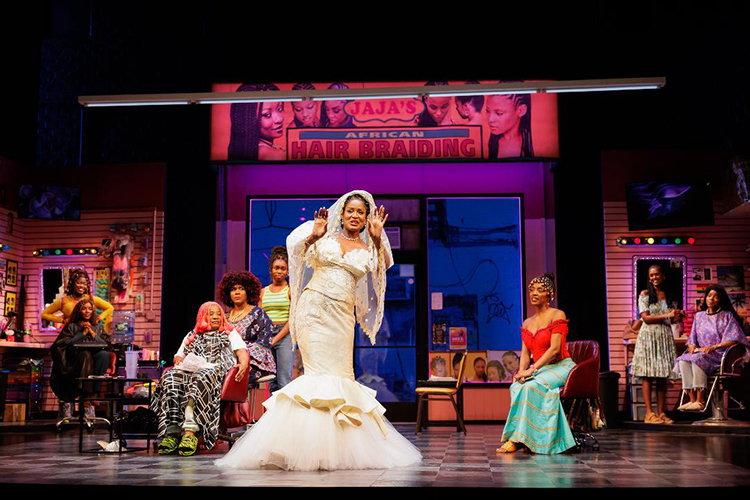
By Sandi Masori

LA JOLLA, California — if you’ve ever wondered what it would be like to spend a day in an African Hair Braiding Salon in Harlem, the La Jolla Playhouse has the answer for you. Set in modern times, the Tony award winning Jaja’s African Hair Braiding, features a delightful and eclectic mix of African and African-American characters as they go about their daily business either working or patronizing the salon.
Playwright Jocelyn Bioh and director Whitney White immerse us in the lives of the women as they navigate petty squabbles over customers, work with challenging clients, and share the slices of their lives that either brought them to America, or are part of their unique immigrant experience.
We don’t meet Jaja (Victoire Charles) until almost the end. Instead, the show starts with her daughter Marie (Jordan Rice) opening the salon and managing it for the day while her mother prepares for her green-card wedding. We later learn that though Marie has been in the United States since she was 4, she is here without papers and has been going to school using her cousin’s name and ID. She is terrified of being sent back to Senegal, where she has no family or ties.
Stylist Miriam (Bisserat Tseggai) from Sierra Leone is preparing for a visit home after three years in the US. She came here for freedom and opportunity, leaving behind a young daughter whom she longs to bring back with her for a better life.
Stylists Ndidi (Aisha Sougou) and Bea (Claudia Logan) squabble over clients after cantankerous Bea’s clients choose to go to the younger Ndidi’s chair instead.
Actors Melanie Brazil, Leovina Charles, and Onye Eme-Akwari each play multiple characters as the salon customers. Eme-Akwari plays all the male bit parts.
Rounding out the immensely talented cast are Mia Ellis and Tiffany Renee Johnson as stylist Aminata and Marie’s schoolmate Jennifer respectively. The characters are delightful, and I recognized some of the phrases that are popular amongst my African friends in the dialogue. For example, I have a friend from South Africa who ends most sentences with “I’m telling you” just like the character Bea does. Hearing some of those very real cultural turn of phrases made me smile, thinking of my friends.
For most of the show, the pace moves along nicely, bringing you into the lives of the women, which though enjoyable, doesn’t seem to be going anywhere. The real conflict and drama happen only in the last 20-30 minutes of the 90-minute play. And then once it does happen, the show soon ends- a little abruptly in my opinion.
I don’t want to give it away but I will say this, when push comes to shove the women put their differences aside and band together.
Throughout the show, they make reference to Jaja’s fiancé, Steven, who no one seems to really like. I was a little disappointed that while it’s never mentioned that he’s Jewish specifically, his last name is Jacobson, which to me sounds Jewish. Perhaps if this were a less politically fraught time for us, I would be less sensitive to villains (albeit a low-key one whom we never actually meet) with Jewish-sounding surnames, but I couldn’t help but wish that he could’ve just been a Smith or something more generic.
All the same, I think this is a show worth watching, with interesting characters, and the time moves quickly. But you’ll have to hurry as the run ends on June 15.
*
Associate editor Sandi Masori is a theater and restaurant reviewer for San Diego Jewish World.